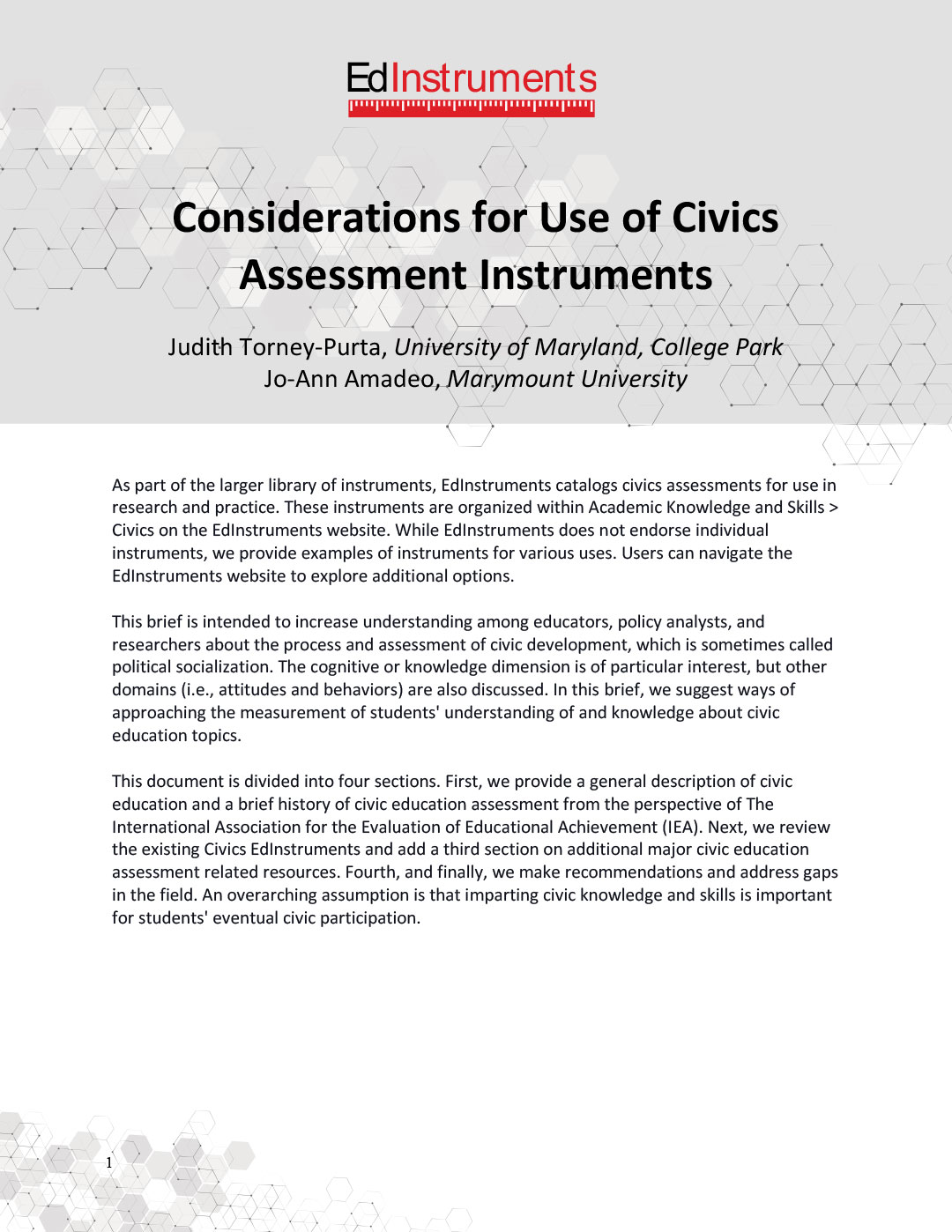Instruments
Civics
As part of the larger library of instruments, EdInstruments catalogs civics assessments for use in research and practice. These instruments are organized within Academic Knowledge and Skills > Civics on the EdInstruments website. While EdInstruments does not endorse individual instruments, we provide examples of instruments for various uses. Users can navigate the EdInstruments website to explore additional options.
This brief is intended to increase understanding among educators, policy analysts, and researchers about the process and assessment of civic development, which is sometimes called political socialization. The cognitive or knowledge dimension is of particular interest, but other domains (i.e., attitudes and behaviors) are also discussed. In this brief, we suggest ways of approaching the measurement of students' understanding of and knowledge about civic education topics.
This document is divided into four sections. First, we provide a general description of civic education and a brief history of civic education assessment from the perspective of The International Association for the Evaluation of Educational Achievement (IEA). Next, we review the existing Civics EdInstruments and add a third section on additional major civic education assessment related resources. Fourth, and finally, we make recommendations and address gaps in the field. An overarching assumption is that imparting civic knowledge and skills is important for students' eventual civic participation.
Advanced Placement (AP) US Government and Politics
The Advanced Placement (AP) U.S. Government and Politics test asseses high school students enrolled in the relevant AP course on their understanding of political concepts, including, for example, their ability to analyze foundational documents and apply SCOTUS decisions to real life scenarios.
Category: Academic Knowledge and Skills
Sub-Category: Civics
Grades: 11th Grade, 12th Grade
Florida Civics EOC Assessment
The Florida Civics End-of-Course (EOC) Assessment is required for all Florida public school students taking the required civics course in the middle grades, mostly commonly in Grade 7. The test assesses students' understanding of the origins and purposes of the U.S. political system and government, responsibilitiies of the U.S. citizen, functions and organization of the government, and contemporary issues in world affairs.
Category: Academic Knowledge and Skills
Sub-Category: Civics
Grades: 5th Grade, 6th Grade, 7th Grade, 8th Grade
HEIghten Civic Competency Assessment
The HEIghten Civic Comeptency and Engagement Assessment evaluates college students' learning. It particularly analyzes their knowledge of civic practices and institutions, skills in understanding civic-related situations, and attitudes of engagement. The civic competency portion is 30 questions
Category: Academic Knowledge and Skills
Sub-Category: Civics
Grades: Post secondary
International Civic and Citizenship Education Study (ICCS) Civics Assessment
The International Civic and Citizenship Education Study (ICCS) is the only international, large-scale study of civic and citizenship education.ICCS investigates the ways in which young people are prepared to undertake their roles as citizens in a world where contexts of democracy and civic participation continue to change. ICCS reports on students’ knowledge and understanding of concepts and issues related to civics and citizenship, as well as their beliefs, attitudes, and behaviors with respect to this domain. For country enrollment, those interested are directed to contact IEA Amsterdam Director Dr. Andrea Netten.
ICCS 2022 participants include: Bulgaria, Brazil, Chile, Chinese Taipei, Colombia, Croatia, Cyprus, Denmark, Estonia, France, Germany (North Rhine-Westphalia and Schleswig-Holstein as benchmarking entities), Italy, Latvia, Lithuania, Malta, Netherlands, Norway, Poland, Romania, Serbia, Slovak Republic, Slovenia, Spain, and Sweden
Category: Academic Knowledge and Skills
Sub-Category: Civics
Grades: 8th Grade, 9th Grade
Missouri Higher Education Civics Examination
The Missouri Higher Education Civics Examination is required for all undergraduates enrolled in a Missouri two-year or four-year college on or after July 1, 2019. It consists of 50 questions and assesses students' knowledge on the U.S. Constitution, U.S. Bill of Rights, governmental institutions, historical manifestations of federalism, and the history of constitutional interpretation and amendments.
Category: Academic Knowledge and Skills
Sub-Category: Civics
Grades: Post secondary
National Assessment of Educational Progress (NAEP) - Civics
NAEP Civics measures civic knowledge and skills related to the responsibilities of citizenship. It is congressionally mandated and administered by the National Center for Education Statistics (NCES). Currently, NAEP Civics is administered only to Grade 8 students. In the past, the assessment was also administered to Grade 4 and Grade 12 students.
Category: Academic Knowledge and Skills
Sub-Category: Civics
Grades: 8th Grade
USCIS Naturalization Test - Civics
The civics portion of the United States Citizenship and Immigration Services (USCIS) Naturalization Test consists of 100 potential items (typically 10 randomly drawn in USCIS practice) and assesses those applying for citizenship on their knowledge of U.S. history and government. Numerous states also utilize some form of this test as a graduation requirement for high school students.
Category: Academic Knowledge and Skills
Sub-Category: Civics
Grades: 11th Grade, 12th Grade, Post secondary
